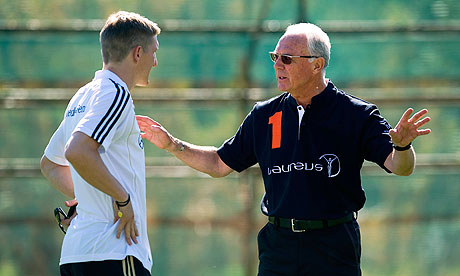
• Former Germany captain says England have gone backwards
• Germans have advantage with Jabulani, says Carragher

Franz Beckenbauer has launched a scathing attack on England's style of play and claimed Fabio Capello's side have "gone backwards into the bad old times of kick and rush".
Beckenbauer, one of the most decorated footballers of all time and captain of the triumphant West Germany team of 1974, claimed Capello had been rendered powerless by the paucity of English players featuring regularly in the higher echelons of the Premier League. The clubs' willingness to buy from abroad, he argued, has come back to haunt the national side.
"What I saw from the English in their 1-1 draw against the United States had very little to do with football," Beckenbauer wrote in a South African newspaper after watching England's draw on Saturday.
"It looked to me as if the English have gone backwards into the bad old times of kick and rush. I am not sure if the England coach Fabio Capello can still change much there. The English are being punished for the fact that there are very few English players in the Premier League clubs as they use better foreign players from all over the world."
Capello may agree with Beckenbauer's observation about the number of English players in the top flight, having previously complained that only around 38% of the talent in the Premier League is available to him. Yet, despite his team being at times careless with possession against the USA on Saturday, he would reject the suggestions of a return to a long-ball game.
Regardless, England's toils against the USA contrasted markedly with Germany's 4-0 dismissal of Australia some 24 hours later. That game was played at sea level in Durban, though England's players noted the Germans' success in taming the much criticised Adidas Jabulani ball, with the Bundesliga having adopted the World Cup ball, which had been launched last December, this year. The Premier League has a deal with Nike and could not follow suit, while the Football Association is contracted to Umbro for international fixtures, thereby preventing Capello's side experimenting with the new ball in the friendly with Egypt in March. England have been using it every day since they gathered in Austria for a pre-tournament training camp, barring the Wembley friendly against Mexico.
The Jabulani was, however, used in domestic leagues in Switzerland, Portugal, the United States, South Africa and the Netherlands last season, and in the French Cup and the Africa Cup of Nations. No complaints over its performance were received, with tests in sessions at Chelsea, Real Madrid and Milan also producing positive feedback.
"We supplied the national federations with the ball in February," said Thomas van Schaik, an Adidas spokesman. "Obviously, we stressed they needed to use it and we offered it to them for usage. The reason we chose February was because, following the launch in December, there had not been any internationals. That meant that the national teams would have the first opportunity to have access to the ball at the same time."
The fact that the Germans took them up on that offer may now be working in their favour. Joachim Löw's side were impressive against Australia, with Lukas Podolski, Miroslav Klose, Thomas Müller and Cacau all scoring. "It gives them an advantage, that is obvious," said the England defender Jamie Carragher when told that the Germans had experienced Jabulani in the Bundesliga. "The ball is very different. Every training session we always start by passing 30 or 40 yards to each other just for that reason alone. I am sure it has helped them and they played so well, so perhaps that is something to cling on to – that they might have been playing with the ball for a while.
"It is an advantage if you've been training with it, but it is a little bit inconsistent. Sometimes you really don't know what it is going to do when you are knocking ball to each other: sometimes it goes straight on, other times it just deviates at the last minute. The idea behind the ball was clearly to create more goals, and it does strange things to make it a more exciting tournament."
- Octopus Paul v Ahmadinejad [28/07]
- France suspend entire World Cup squ [24/07]
- Webb says World Cup final was taint [23/07]
- Goal-line technology off Fifa agend [20/07]
- World Cup final ball sold for £48K [18/07]
- Evra 'is being victimised', says Fe [17/07]
- Scolari says no offer yet to coach [16/07]
- Beckham: England players must take [15/07]
- Messi says WCup loss left him with [15/07]
- Now it's Brazil's turn to get ready [15/07]
| Years | Winners | Runner-up | Third place |
| 2006 | Italy | France | Germany |
| 2002 | Brazil | Germany | Turkey |
| 1998 | France | Brazil | Croatia |
| 1994 | Brazil | Italy | Sweden |
| 1990 | Germany | Argentina | Italy |
| 1986 | Argentina | Germany | France |
| 1982 | Italy | Germany | Poland |
| 1978 | Argentina | Holland | Brazil |
| 1974 | Germany | Holland | Poland |
| 1970 | Brazil | Italy | Germany |
| 1966 | England | Germany | Portugal |
| 1962 | Brazil | Czech | Chile |
| 1958 | Brazil | Sweden | France |
| 1954 | Germany | Hungary | Austria |
| 1950 | Uruguay | Brazil | Sweden |
| 1938 | Italy | Hungary | Brazil |
| 1934 | Italy | Czech | Germany |
| 1930 | Uruguay | Argentina | America |


